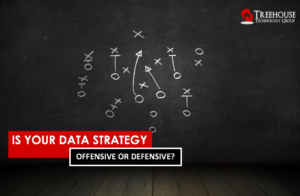In our fast-paced world, it can sometimes be challenging for companies to take a step back before acting on impulse. They’re told they must keep changing and adapting to an ever-evolving landscape in order to stay relevant and competitive in today’s market.
While this is certainly true, sometimes more harm can be done if they act – or react – too quickly. This is especially true for data-driven companies, which would benefit from taking the time to define their data management process instead of reacting in an ad hoc way.
Constantly responding to data reporting or analytical needs as they arise isn’t necessarily a bad thing. But it will only take you so far.
If you truly want to take advantage of all your data has to offer, then you really need to pump the brakes and develop a more comprehensive approach to managing your data.
Here are a few tips to help you get started:
Define your key metrics.
Start by asking: what are the key metrics we want to track within our business? Or, what is important to us and what drives performance in our company? Answering these questions allows you to hone in on what you’re trying to achieve with your data so that you can develop a process to achieve it. It also allows you to ignore and eliminate any unnecessary effort spent on meaningless metrics.
Define the standard taxonomy for your company.
Determining how data and subsequent metrics should be defined throughout the company and ensuring the definition is consistent throughout the organization plays a vital role not only in the integrity of your data, but in its ability to provide the most value. Furthermore, you spend less time arguing in meetings about what each metric really means and represents.
Define data ownership.
Who looks after all your data and who manages it? Defining ownership and data sharing standards across your organization is critical to ensuring the security and accuracy of your company’s data. Without a captain, you will sail in circles.
Build a proper data warehouse or data model.
Building a data warehouse is an essential component to business intelligence. It ensures the consistency and standardization of data coming from multiple sources, enabling you to derive insights faster and more effectively in order to make better business decisions. Take the time to ensure:
- The proper database constraints and data integrity monitoring so that you can trust what the data is telling you
- The proper security and access controls so that you can trust that it is safe
- The proper performance optimizations so that you can get answers to your questions now, rather than tomorrow
The Conclusion
The value derived from taking the time to address the points listed above should not be understated. After you have taken these steps, you can begin to automate not only your data management tasks, but also your reporting needs. You can also implement tools to help provide self-service reporting to explore your information in new ways. And so, while going through this process forces you to slow down, it will ultimately help you speed up your operations in the long run and become more efficient in responding to your data needs.
If you’re in need of a robust data management process, TTG can help. Contact us today for a free consultation.


